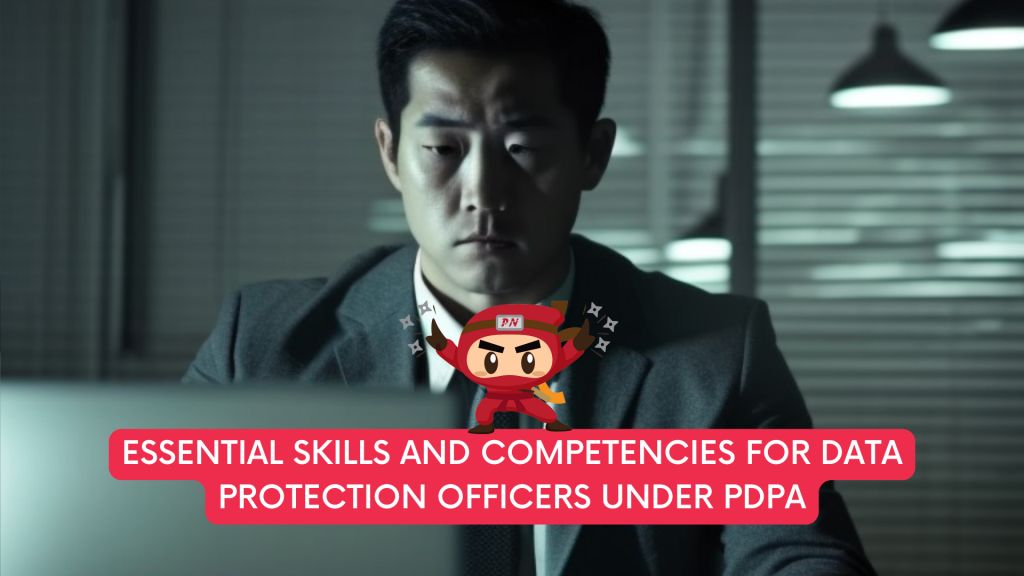
Data Protection Officers (DPOs) play a pivotal role in ensuring that organizations adhere to the Personal Data Protection Act (PDPA) and maintain compliance with its regulations.
Their responsibilities demand a wide range of skills and competencies, which enable them to effectively manage data protection tasks and navigate the complexities associated with PDPA compliance.
With the role they play, here are the essential skills and competencies that DPOs must possess to excel in their role and contribute to their organisation’s data protection efforts.
DPOs must possess an in-depth understanding of PDPA regulations, including its key principles, provisions, exceptions, and exclusions. This knowledge enables DPOs to guide their organizations in creating and implementing data protection policies and procedures that align with the PDPA.
A solid foundation in data analysis and management, including skills in database management systems (DBMS) and data visualization, is essential for DPOs. These skills allow DPOs to effectively oversee the collection, storage, processing, and protection of personal data within their organizations.
DPOs must possess strong critical thinking skills to assess potential risks and vulnerabilities in their organization’s data protection strategies. By considering all angles of a problem and evaluating the data sources, DPOs can develop effective strategies for mitigating risks and ensuring compliance with PDPA regulations.
DPOs should be able to communicate complex data protection concepts and requirements in clear, business-relevant terms. This skill is crucial for fostering a culture of data protection within an organization and ensuring that all employees understand their responsibilities under the PDPA.
As technology evolves, DPOs must stay current on emerging technologies and their potential impact on data protection. This knowledge enables DPOs to assess and implement new technologies that can enhance their organization’s data protection strategies and compliance efforts.
DPOs must be skilled in developing and delivering training and awareness programs that cover the key provisions of the PDPA, their organization’s data protection policies, and any relevant industry-specific guidelines. By providing effective training, DPOs can ensure that employees understand the importance of data protection and their responsibilities under the PDPA.
Data Protection Officers play a vital role in ensuring organizations’ compliance with the Personal Data Protection Act. By possessing a comprehensive understanding of PDPA regulations, data analysis and management skills, critical thinking abilities, effective communication, knowledge of emerging technologies, and expertise in training and education, DPOs can effectively guide their organizations in protecting personal data and complying with the PDPA.
Your appointed DPO can work with you on your PDPA compliance, ensuring that there will be policies in place to make sure that the handling of personal data is PDPA compliant. This includes promptly responding to the PDPC with their queries to expedite the investigations and prevent a harsher penalty from the Commission.
A Data Protection Officer (DPO) oversees data protection responsibilities and ensures that organisations comply with the Personal Data Protection Act (PDPA). Furthermore, every Organization’s DPO should be able to curb any instances of PDPA noncompliance as it is the officer responsible for maintaining the positive posture of an organisation’s cybersecurity.
DPOs complement organisations’ efforts to ensure that the organisation’s methods of collecting personal data comply with the PDPA. It also ensures that policies are set in place to make sure that there will be no instances of data breaches in the future.
Don’t wait any longer to ensure your organisation is PDPA compliant. Take our free 3-minute PDPA Compliance Self-audit checklist now, the same “secret weapon” used by our clients to keep them on track. Upon completion, we will send you the results so you can take the necessary action to protect your customers’ data. Complete the free assessment checklist today and take the first step towards protecting your customers’ personal data.
Importance of Efficient Access Controls that every Organisation in Singapore should take note of. Enhancing…
Prioritizing Security Measures When Launching a Webpage That Every Organisation in Singapore should take note…
Importance of Regularly Changing Passwords for Enhance Online Security that every Organisation in Singapore should…
Comprehensive Approach to Data Protection and Operational Integrity that every Organsiation in Singapore should know…
Here's the importance of Pre-Launch Testing in IT Systems Implementation for Organisations in Singapore. The…
Understanding Liability in IT Vendor Relationships that every Organisation in Singapore should look at. Understanding…
This website uses cookies.